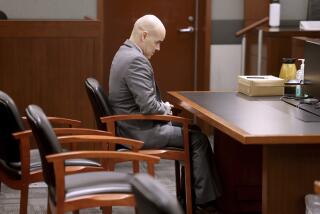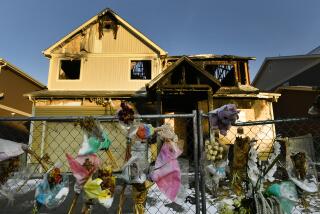Verdicts Bring Biehl Family Sense of Relief
NEWPORT BEACH — Nine hours after the first television news crew woke him at 3:30 a.m. Tuesday, Peter Biehl finally cried.
The father of Fulbright scholar Amy Biehl, who was stoned and stabbed to death by a mob in South Africa last year, nearly succeeded in keeping his composure as he spoke to a string of reporters about the three guilty verdicts handed down Tuesday half a world away.
But after laughing at stories of his daughter’s life in college, reliving the family’s experiences in South Africa and breathing relief over the sense of closure brought by the murder convictions, Peter Biehl and his 28-year-old daughter, Kimberly, became subdued. Both said the verdicts will never erase the image of Amy Biehl’s bloody death.
“I still can’t deal with the violence, the violence that happened to her,” Kimberly Biehl said. “I can’t read about it. I can’t think about it. It destroys me for the rest of the day.”
Peter Biehl, nestled in the corner of a brown couch, took a deep sigh and wiped away tears behind his eyeglasses.
“Going to the site of her death was difficult,” he said. “The other thing is the certain knowledge we’ll never see Amy again.
“The hardest thing for a parent is losing a child--and the fact that she died so far away. If only we’d been there, just to hold her.”
Amy Biehl, who was in Guguletu township outside Cape Town helping to develop a voter registration program, was stoned and stabbed to death while driving friends home on Aug. 25, 1993. The killing--one of the first among slayings of foreigners during pre-election violence in South Africa--occurred only days before she was to return home to pursue a doctoral degree.
According to police accounts, Amy Biehl was driving her Mazda when a brick smashed through its windshield. Screaming, “One settler, one bullet!” a group of youths pulled her from the car and beat her.
Mongezi Manquina, 22, Mzikhona Nofemela, 19, and Vusumzi Ntamo, 21, members of the militant Pan Africanist Student Organization, were among a group of seven young men arrested in the days following Biehl’s death. Charges against three of the youths were dropped when a witness refused to testify. A fourth defendant, a juvenile, still awaits trial.
The prosecutor in the case immediately sought the death penalty after Judge Gerald Friedman handed down the guilty verdicts Tuesday. But a defense lawyer asked for leniency because of the young men’s living conditions under apartheid and the highly charged political climate.
Amy Biehl’s family believes her attackers should not be given the death penalty when they are sentenced, possibly today. Linda Biehl said her daughter was opposed to capital punishment.
“I don’t feel in this case more death is going to help anything,” Linda Biehl said. “Yet I did not sense remorse in (the convicted killers) at all. I would hope they would eventually feel some . . . “ she paused, choosing her words carefully, “understanding and guilt.”
Zachary Biehl, Amy’s 17-year-old brother, added: “I think they should definitely be put away for a long time.”
People “can’t blame three individuals for the huge problems they’ve had there” in South Africa, Zachary Biehl said. “Apartheid and inequity built up a lot of the anger. You have to consider that.”
Since the slaying, the Biehls have learned more about South Africa and its people than they previously understood from headlines about elections and apartheid. Photos in a thick album on their coffee table show Zachary and daughters Kimberly and Molly, 24, surrounded by local children at squatters’ camps.
Linda Biehl recalled the moment when she first stood at the site where her daughter was stoned and stabbed. “A strong woman grabbed me and said: ‘Mama! Mama Biehl!’ ” she remembered. “She just grabbed me with a passion and emotion and needed to recite her grief to me.
“I never even knew her name, and she was gone.”
The Biehls have established the Amy Biehl Fund to help finance grass-roots projects, mostly in South Africa, such as those in which their daughter participated before her death. In the future, they hope to hold more fund-raising events for the foundation. Proceeds from a possible film or book about Amy Biehl’s life would go to the fund, they said.
Family members said they hoped the trial would offer South Africa an opportunity to show the world and its own citizens that its justice system can work.
“In a sense, this is a small milestone for South Africa,” Peter Biehl said.
“I wouldn’t like to think it’s just a verdict for Amy,” Linda Biehl added, “but for all the others who’ve lost their lives working toward democracy there. This group of people that did this to Amy, this group was not the soul of South Africa.”
More to Read
Sign up for Essential California
The most important California stories and recommendations in your inbox every morning.
You may occasionally receive promotional content from the Los Angeles Times.










